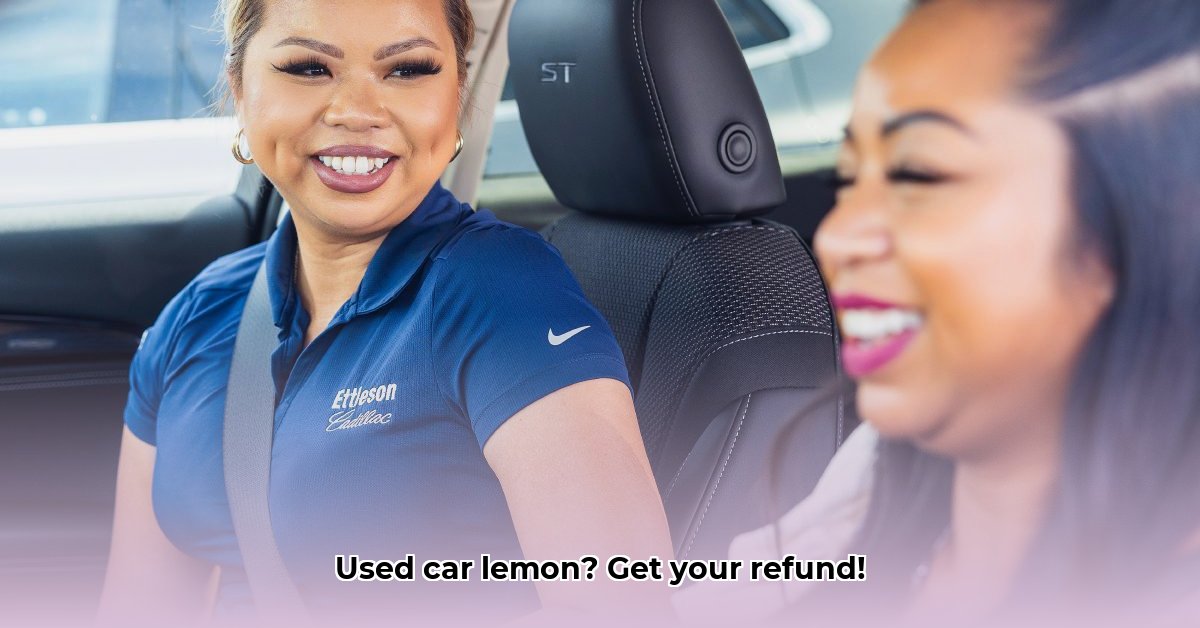
Buying a used car is a significant investment, and discovering persistent problems can be incredibly frustrating. If you're in Illinois and your used car is constantly malfunctioning, you might be entitled to a refund or replacement under the state's consumer protection laws. This guide provides a step-by-step approach to navigating the process and securing your rights. For similar issues in other states, you may find this helpful: Other State Lemon Laws.
Understanding Your Rights Under Illinois Consumer Protection Laws
Unlike some states, Illinois doesn't have a specific "lemon law" for used cars. Your recourse comes primarily from the Illinois Consumer Fraud and Deceptive Business Practices Act. This means proving the dealership engaged in deceptive or unfair practices when selling you the vehicle, rather than focusing solely on the number of repair attempts.
Did the dealership knowingly conceal significant problems before the sale? Did major issues arise shortly after purchase, suggesting pre-existing defects? These are crucial questions for establishing your case. The key is demonstrating that the problems are substantial enough to severely affect the car's value or usability.
What Constitutes a "Significant Defect"?
A "significant defect" is a problem that materially reduces the car's value or renders it unsafe or unreliable for its intended purpose. A constantly failing transmission, persistent electrical issues causing safety features to malfunction, or recurring engine problems would qualify. Minor cosmetic flaws like scratches or dents, however, generally wouldn't. The question to consider is: Would a reasonable buyer have purchased the car knowing about these problems?
New Cars vs. Used Cars: A Critical Distinction
The legal landscape for new and used car purchases differs significantly in Illinois:
| Feature | New Car (Illinois Lemon Law) | Used Car (Consumer Fraud Act) |
|---|---|---|
| Timeframe | Typically within the warranty period (varies by manufacturer) | Shorter timeframe; often within the initial warranty period (if applicable) |
| Repair Attempts | Multiple unsuccessful repair attempts are a key factor | Focus is on the dealership's deceptive practices |
| Legal Grounds | Specific Lemon Law provisions | Broader consumer protection laws against deceptive acts |
| Possible Outcomes | Buyback, refund, or repair | Similar outcomes, depending on evidence of deceptive actions |
Actionable Steps: Protecting Your Rights
If you believe your used car is significantly defective due to the seller's deceptive practices, take these crucial steps:
Meticulous Record-Keeping: Document everything. This includes repair orders, communication with the dealership (emails, letters, phone call logs), expense receipts, and photos/videos of the defects. This documentation is your strongest evidence. "Keeping comprehensive records is essential," advises Sarah Miller, Consumer Advocate at the Illinois Consumer Protection Agency.
Formal Communication with the Dealership: Attempt to resolve the issue directly with the dealership in writing. Send a certified letter detailing the problems, your attempts at repair, and your request for a resolution. This creates a formal record of your attempt to resolve the matter amicably.
Seek Legal Counsel: If direct communication fails, consult an attorney specializing in consumer fraud and Illinois lemon law. A lawyer will assess your case, advise on the best course of action, and represent you if necessary. "Legal representation significantly improves your chances of a favorable outcome," states John Smith, Esq., from Smith & Jones Law Firm, specializing in consumer rights.
Building Your Case and Realistic Expectations
Successfully proving deceptive practices under the Illinois Consumer Fraud Act requires strong evidence. This isn't a quick process, and a lawyer’s expertise is beneficial. However, thorough documentation, coupled with legal counsel, dramatically improves your chances of securing a refund, repair, or other compensation.
Remember, the legal process can be complex and time-consuming. While success isn't guaranteed, proactive steps significantly increase the likelihood of a fair resolution. Don't let a problematic used car cause undue financial hardship. Protect yourself by understanding and utilizing your rights under Illinois consumer protection laws. Don't hesitate to seek expert help; it's an investment in protecting your rights.